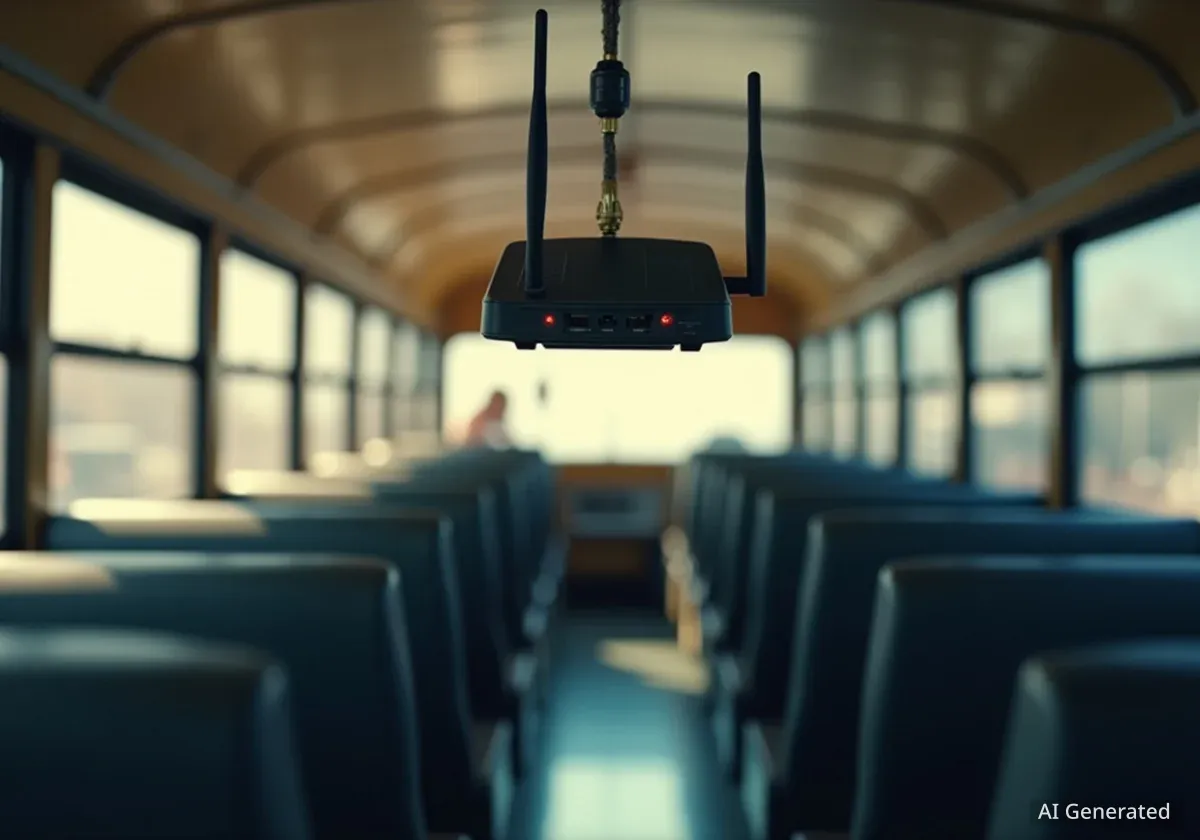The Federal Communications Commission has voted to end federal E-rate funding for school bus Wi-Fi and mobile hotspots, a decision that reverses a recent expansion of the program. The 2-1 vote on Tuesday immediately halts discounts for these services, affecting millions of dollars in pending funding requests from schools and libraries nationwide.
The policy change directs the Universal Service Administrative Company, which manages the E-rate program, to deny all outstanding applications for the 2025 fiscal year. This leaves school districts that have already purchased these services for the 2025-26 academic year searching for alternative funds to cover the unexpected costs.
Key Takeaways
- The FCC voted 2-1 to remove school bus Wi-Fi and internet hotspots from the E-rate program.
- The decision immediately affects over $57 million in funding requests for the 2025 fiscal year.
- Schools that already procured these services for the 2025-26 school year will not receive expected reimbursements.
- The debate centers on whether the 1996 Telecommunications Act allows funding for services outside of physical school buildings.
Immediate Financial Impact on Schools
The FCC's decision has significant financial consequences for school districts across the country. According to federal data, schools and libraries had shown strong interest in using the E-rate program for mobile connectivity.
For the 2025 fiscal year, applicants had requested $42.6 million for internet hotspots and another $15.3 million for school bus Wi-Fi. With the program's reversal, these requests, totaling nearly $58 million, are now set to be denied.
Funding Requests Denied
For Fiscal Year 2025, the FCC's decision will impact:
- $42.6 million requested for mobile hotspots.
- $15.3 million requested for Wi-Fi on school buses.
- $57.9 million total in pending funding applications.
Michael Flood, founder and CEO of the technology consulting firm Alpine Frog, stated that many school districts will face difficulties due to this abrupt policy shift. He noted that districts have not yet received funding commitment letters for these services.
As a result, many schools that have already paid for hotspot and bus Wi-Fi services for the upcoming 2025-26 school year will now have to absorb the full cost, creating unexpected budget shortfalls. Flood predicted that many districts “will suffer” from the financial strain caused by the loss of anticipated federal reimbursement.
The Core Legal and Philosophical Debate
The vote highlighted a fundamental disagreement among FCC commissioners about the scope and interpretation of the E-rate program's founding legislation, the Telecommunications Act of 1996.
Chairman Carr's Position
FCC Chairman Brendan Carr, who led the call for the vote, argued that the previous expansion to include mobile services was an overreach of the agency's authority. He contended that the 1996 law specifically designated E-rate funds for services within classrooms and libraries.
“A school bus is neither,” Carr stated during the commission's open meeting. “We cannot simply reinterpret the statutory term ‘classrooms’ to mean any place where learning might occur.”
This strict interpretation of the law formed the basis of his opposition to the expansions when they were initially approved in 2023 and 2024 under the previous FCC leadership.
Commissioner Gomez's Dissent
FCC Commissioner Anna Gomez, who cast the lone dissenting vote, presented a counterargument. She maintained that Congress intended for the FCC to adapt the E-rate program as technology and educational needs evolve.
“It would be incredibly naive for us to think that in our post-pandemic world, learning has returned to solely in-person and on paper,” Gomez said. She emphasized that the communications landscape has changed dramatically since the program's inception, making mobile connectivity essential for modern education.
Closing the 'Homework Gap'
The original expansion of the E-rate program was championed by former FCC Chairwoman Jessica Rosenworcel. The primary goal was to address the "homework gap"—the disadvantage faced by students who lack reliable internet access at home. Providing Wi-Fi on school buses and mobile hotspots was seen as a direct way to give these students more opportunities to complete assignments and access online educational resources.
Widespread Opposition from Advocates and Lawmakers
The FCC's decision was met with strong criticism from education advocacy groups and Democratic lawmakers, who argue that the move will harm students and create unnecessary burdens for schools.
The coalition All4Ed released a statement warning that eliminating these funds “will impose unnecessary costs and confusion on schools, libraries, and families.” The group stressed that the E-rate expansions were crucial for narrowing the homework gap and ensuring all students have the connectivity needed to succeed.
Just one day before the vote, a group of 52 House and Senate Democrats sent a letter to Chairman Carr, urging him to abandon the plan. In their letter, they called on the FCC to ensure that schools expecting reimbursement for these services would be paid “as promised.”
Broader Political Context
The FCC's vote aligns with previous efforts by some Republican lawmakers to limit the E-rate program's scope. Earlier this year, Senator Ted Cruz of Texas led a successful measure in the Senate to overturn the 2024 decision to cover hotspots under E-rate.
Following that 50-38 vote in May, Cruz described the hotspot expansion as “illegal, harmful to children, duplicative of other government programs, and a blatant overreach.” He also raised concerns that school-issued hotspots could expose students to inappropriate online content without parental oversight.
During her dissent, Commissioner Gomez addressed this concern directly. She reminded the commission that the Children’s Internet Protection Act (CIPA), a federal law passed in 2000, already mandates that schools receiving E-rate funds must implement technology protection measures. These measures are designed to block or filter harmful content on school-issued devices and networks, regardless of where they are used.





